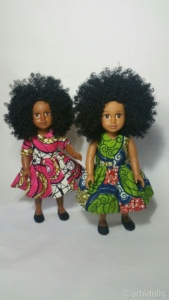While growing up, my mum bought me a black doll. I found that to be a bit strange and only played with the white dolls I had. I thought white was better than black because of the hair and the colour the dolls had. This actually meant that I didn’t love myself or where I came from without realising it. But as I grew up, I learnt to embrace how I looked like by loving my skin colour and the texture of my hair.

Unfortunately when you went to the market to buy the dolls, you rarely get the chance to spot black dolls. There has been a lack of representation of African people especially when it came to dolls.
But over the years this norm has been changed and now there’s a wide range of black dolls. Parents are now teaching their children the importance of diversity and the beauty in diversity through these dolls and children are also learning about their African culture and heritage from a very young age.
Mala Bryan is a doll maker in South Africa known for her Mallaville doll collection. Her goal: “to inspire creative imagination.” Her dolls’ complexions range from the honey sun kissed tone all the way to the rich midnight complexion made popular by Sudanese model, Nyakim Gatwech, nicknamed Queen of the Dark.
Taofick okoya is the founder of “Queens of Africa” in Nigeria. His dolls have been described as the Nigerian rival to the classic Barbie doll. His doll range depicts various Nigerian ethnicities.The dolls also reflects a variety of African hairstyles. Customers may opt for dolls rocking an afro, or alternatively one with braids or braid extensions.
His mission is to spread a message which enforces young black girls their self-esteem, allowing them from an early age to have role models they can relate to. Tawfick Okoya says he wants his range of dolls to be a positive example of African history, culture and fashion so that girls can feel proud of their heritage.
Rokhaya Diop from Senegal is the creator of Urbi dolls. Hers is a range of black and mixed dolls. Her dolls are exclusively reserved for black and mixed-race girls and are also intended for white girls, to make them discover other dolls which represent their friends.
The idea to make these kind of dolls came to her when she decided to surprise her niece called Binta with a black doll, that actually resembled her appearance. Through her dolls, she sends a strong message that black is beautiful. That a little girl should not be ashamed of her hair, nor of her skin colour.
Kindly follow us on twitter:@AfricanVoice2









